See also
- "9 IX 1944", the motto on the emblem of the People's Republic of Bulgaria from 1947 to 1971
9 September 1944 is a date.
9 September 1944 may also refer to:
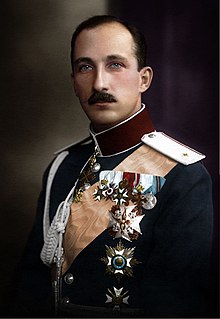
Boris III, originally Boris Klemens Robert Maria Pius Ludwig Stanislaus Xaver, was the Tsar of the Kingdom of Bulgaria from 1918 until his death in 1943.
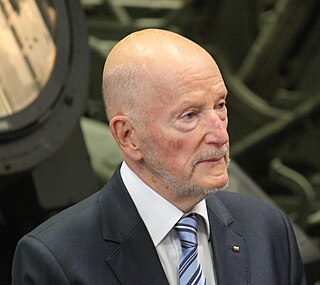
Simeon Borisov von Saxe-Coburg-Gotha is a Bulgarian politician who reigned as the last tsar of the Kingdom of Bulgaria as Simeon II from 1943 until 1946. He was six years old when his father Boris III of Bulgaria died in 1943 and royal power was exercised on his behalf by a regency led by Simeon's uncle Kiril, Prince of Preslav, General Nikola Mihov and prime minister, Bogdan Filov. In 1946 the monarchy was abolished by referendum, and Simeon was forced into exile.
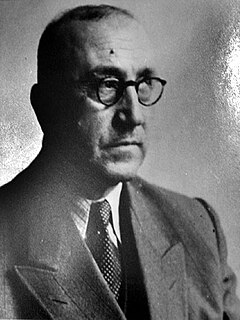
Kimon Georgiev Stoyanov was a Bulgarian general who was the Prime Minister of the Kingdom of Bulgaria from 1934 to 1935 and again from 1944 to 1946.

Macedonia most commonly refers to:

Fyodor Ivanovich Tolbukhin was a Soviet military commander and Marshal of the Soviet Union.
The Bulgarian First Army was a Bulgarian field army during the Balkan Wars, World War I and World War II.
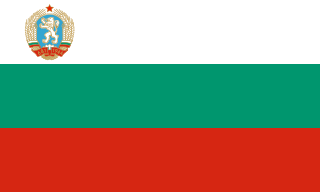
The People's Republic of Bulgaria was the official name of Bulgaria, when it was a socialist republic from 1946 to 1990, ruled by the Bulgarian Communist Party (BCP) together with its coalition partner, the Bulgarian Agrarian People's Union. Bulgaria was closely allied with the Soviet Union during the Cold War, being part of Comecon as well as a member of the Warsaw Pact. The Bulgarian resistance movement during World War II deposed the Kingdom of Bulgaria administration in the Bulgarian coup d'état of 1944 which ended the country's alliance with the Axis powers and led to the People's Republic in 1946.

The history of Bulgaria during World War II encompasses an initial period of neutrality until 1 March 1941, a period of alliance with the Axis Powers until 8 September 1944, and a period of alignment with the Allies in the final year of the war. Bulgarian military forces occupied with German consent parts of the kingdoms of Greece and Yugoslavia which Bulgarian irredentism claimed on the basis of the 1878 Treaty of San Stefano. Bulgaria resisted Axis pressure to join the war against the Soviet Union, which began on 22 June 1941, but did declare war on Britain and the United States on 13 December 1941. The Red Army entered Bulgaria on 8 September 1944; Bulgaria declared war on Germany the next day.

Macedonian nationalism is a general grouping of nationalist ideas and concepts among ethnic Macedonians that were first formed in the late 19th century among separatists seeking the autonomy of the region of Macedonia from the Ottoman Empire. The idea evolved during the early 20th century alongside the first expressions of ethnic nationalism among the Slavs of Macedonia. The separate Macedonian nation gained recognition after World War II when the "Socialist Republic of Macedonia" was created as part of Yugoslavia. Afterwards the Macedonian historiography has established historical links between the ethnic Macedonians and events and Bulgarian figures from the Middle Ages up to the 20th century. Following the independence of the Republic of Macedonia in the late 20th century, issues of Macedonian national identity have become contested by the country's neighbours, as some adherents to aggressive Macedonian nationalism, called Macedonism, hold more extreme beliefs such as an unbroken continuity between ancient Macedonians, and modern ethnic Macedonians, and views connected to the irredentist concept of a United Macedonia, which involves territorial claims on a large portion of Greece, along with smaller regions of Albania, Bulgaria, Kosovo and Serbia.
Orders, decorations and medals of Bulgaria are regulated by the law on the Orders and Medals of the Republic of Bulgaria of 29 May 2003.
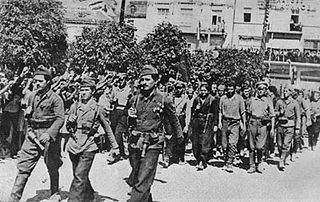
The 1944 Bulgarian coup d'état, also known as the 9 September coup d'état, was the forcible change of the government of Kingdom of Bulgaria carried out on the eve of 9 September 1944. In the People's Republic of Bulgaria it was called People's Uprising of 9 September – on the grounds of the broad unrest, and Socialist Revolution – as it was a turning point politically and the beginning of radical reforms towards socialism.

The PZL.43 was a Polish light bomber and reconnaissance aircraft designed in the mid-1930s by PZL in Warsaw. It was an export development of the PZL.23 Karaś. Its main user was the Bulgarian Airforce who called it the Chaika.

Ohrana were armed collaborationist detachments organized by the former Internal Macedonian Revolutionary Organization (IMRO) structures, composed of Bulgarians in Nazi-occupied Greek Macedonia during World War II and led by officers of the Bulgarian Army. Bulgaria was interested in acquiring Thessalonica and Western Macedonia, under Italian and German occupation and hoped to sway the allegiance of the 80,000 Slavs who lived there at the time. The appearance of Greek partisans in those areas persuaded the Axis to allow the formation of these collaborationst detachments. However, during late 1944, when the Axis appeared to be losing the war, many Slavophone Nazi collaborators, Ohrana members and VMRO regiment volunteers fled to the opposite camp by joining the newly founded communist SNOF. The organization managed to recruit initially 1,000 up to 3,000 armed men from the Slavophone community that lived in the western part of Greek Macedonia.

The Bulgarian Resistance was part of the anti-Axis resistance during World War II. It consisted of armed and unarmed actions of resistance groups against the Wehrmacht forces in Bulgaria and the Tsardom of Bulgaria authorities. It was mainly communist and pro-Soviet Union. Participants in the armed resistance were called partizanin and yatak.
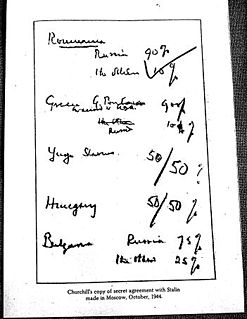
The Percentages Agreement was a secret informal agreement between British prime minister Winston Churchill and Soviet leader Joseph Stalin during the Fourth Moscow Conference in October 1944. It gave the percentage division of control over Eastern European countries, dividing them into spheres of influence. Franklin Roosevelt was consulted tentatively and conceded to the agreement. The content of the agreement was first made public by Churchill in 1953 in the final volume of his memoir. The US ambassador Averell Harriman, who was supposed to represent Roosevelt in these meetings, was excluded from this discussion.

World War II in Yugoslav Macedonia started with the Axis invasion of Yugoslavia in April 1941. Under the pressure of the Yugoslav Partisan movement, part of the Macedonian communists began in October 1941 a political and military campaign to resist the occupation of Vardar Macedonia. Officially, the area was called then Vardar Banovina, because the very name Macedonia was prohibited in the Kingdom of Yugoslavia. It was occupied mostly by Bulgarian, but also by German, Italian, and Albanian forces.
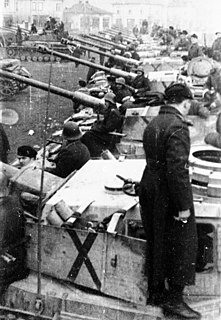
The Kosovo Operation was a series of military operations leading up to one final push during World War II, launched by the Bulgarian army with the assistance of Albanian and Yugoslav Partisans to expel German forces from Kosovo and prevent the retreat of German forces from Greece. German Army Group E was withdrawing through it from Greece towards Bosnia, since the escape route through Niš and Belgrade had been closed by the Yugoslav Partisan, Bulgarian and Soviet forces.

The Belgrade offensive or the Belgrade strategic offensive operation was a military operation during World War II in Yugoslavia in which Belgrade was liberated from the German Wehrmacht through the joint efforts of the Soviet Red Army, Yugoslav Partisans, and the Bulgarian Army. Soviet forces and local militias launched separate but loosely cooperative operations that undermined German control of Belgrade and ultimately forced a retreat. Martial planning was coordinated evenly among command leaders, and the operation was largely enabled through tactical cooperation between Josip Broz Tito and Joseph Stalin that began in September 1944. These martial provisions allowed Bulgarian forces to engage in operations throughout Yugoslav territory, which furthered tactical success while increasing diplomatic friction.

101 Dalmatian Street is an animated television series created by Miklos Weigert that aired on Disney Channel in the UK and Ireland from 18 March 2019 to 22 February 2020, and released on Disney+ in Canada and the United States on 28 February 2020. It later aired on Disney XD in the United States from 29 March to 22 November 2021. It is produced by Passion Animation Studios in the United Kingdom and Atomic Cartoons in Canada and features the voices of Josh Brener, Michaela Dietz, Rhashan Stone and Ella Kenion.
Asen Sirakov was a Bulgarian Major-General who fought in both World Wars.